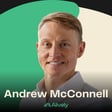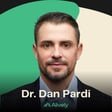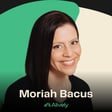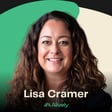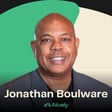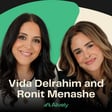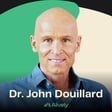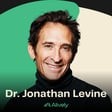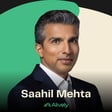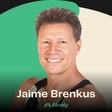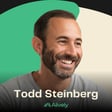The Power and Fleeting Nature of Love
00:00:00
Speaker
What I really align with right now is the idea that love can be a high quality momentary experience that happens between anyone at any point at any time. And yes, it's fleeting, but how just focusing on this, to me, that's a pretty empowering concept.
Introduction to 'Home of Health Spam' and Guest Olivia Ellis
00:00:20
Speaker
This is the Home of Health Spam podcast, where we profile health and wellness role models, sharing their stories and the tools, practices, and routines they use to live a lively life.
00:00:34
Speaker
Olivia Ellis, it is wonderful to see you. We got connected by common friend of ours, Jodi, and I am so excited that you are here with us today. Thank you for having me, Andrew. Excited to be here as well.
00:00:46
Speaker
Now, you are someone who has lots of letters behind her name, do do many things. So before we jump into all of that, how would you describe yourself?
Olivia Ellis: A Journey in Wellness and Fitness
00:00:57
Speaker
I would describe myself as and a lively educator. um So focus very broadly on the wellness industry. So spanning across fitness, ah nutrition, healthy mindset, recovery.
00:01:13
Speaker
So the large umbrella of wellness. Yeah, I mean, you are definitely speaking our language here at the Home Health Span. We always talk about the five pillars with fitness, nutrition, sleep and recovery, stress management mindset, and then our social connection purpose. And I think, you know, your education probably is leading with that purpose to carry across those other four branches. So I look forward to jumping in all of those with you today.
00:01:40
Speaker
Now, if I understand correctly, you started more on the nutrition side, is that fair to say, and educationally? So my career has definitely hopped around. So if anyone's listening to this, watching this, and they feel like they've taken a few zigzags, a few turns in their career, I very much relate.
00:02:03
Speaker
So when i was younger, i thought that i I wanted to go into medicine. And so I was actually pre-med and I realized I was terrified of needles. So it was the worst idea in the world. And I became super interested in nutrition, the idea of nutrition as medicine, and was just for fun reading that and explored being a registered dietitian.
00:02:27
Speaker
From there, I was doing an internship at a location in Mexico and i just...
Exploring Positive Psychology and Athletic Performance
00:02:32
Speaker
fell in love with the fitness industry. And so I started pursuing, you know, getting certified in variety of modalities in the fitness industry. i actually had a career in fitness management and I realized, okay, well, what is it about fitness that I'm so passionate about?
00:02:50
Speaker
And I realized that it was the when you watch someone enter a gym or enter a fitness class and leave a fitness ah class, it's the difference. the the look on their face, the their their energy levels.
00:03:05
Speaker
It's something that's so visible. Like if you were to just sit outside of a fitness center, it's so visible. And I realized it was that. It was that that I was most passionate about. And how do you take that and kind of amplify it?
00:03:17
Speaker
And so I started going down a rabbit hole of positive psychology and the fitness industry, you know, when it comes to athletes and sports and Athletes, professional athletes athletes have sports psychologists, which helped help them to work at their peak.
00:03:34
Speaker
But the question is for the general exerciser, what's most important? In some cases, it might be they might have performance goals, but for the most part, it's how do we make it an enjoyable experience?
00:03:46
Speaker
How do we make it something that people are continuously drawn back to, that they're just intrinsically motivated to pursue? and so I started getting really passionate about positive psychology.
Workshops and Research on Sleep, Stress, and Relationships
00:03:58
Speaker
And then from there, you know, I explored all these different areas and ah some educator roles that I was put in. i also started doing workshops on pretty much everything else. So on, you know, how to pursue good quality of sleep, how to develop a ah healthy relationship with stress and work.
00:04:19
Speaker
My PhD right now is on positive developmental psychology. So I look at a lifespan of what allows someone to live their best life, but my research is on love. And so also leading workshops on high quality relationships, how to...
00:04:34
Speaker
um enhance our current relationships, and also, you know, just seek really high quality interactions throughout the day and how that's related to our various measures of health and well being.
00:04:46
Speaker
So I kind of went at it, you know, one area at a time. But now looking back, it makes so much sense to me, you know, how i've I've ended up here, because I've come to the realization that it's not just about one health behavior. It's not it's not just one about one pillar. It's the whole gamut, which you know if we focus on one, it can definitely help for the others. So that's kind of led me to where I'm at today.
The Importance of Social Connections
00:05:16
Speaker
And yeah, so I'm passionate about about all of it.
00:05:20
Speaker
Yeah, there are so many questions that raises, like every time you'd say something, it's like, okay, that's that's where I'll start. And then you'd say something else and no, that's where I'll start. I actually want to start with the last because i think very similar to the narrative arc of your career so far, it maybe some have inverted, but that the idea of the social connection and the connection in the first place and the level of importance it has, right? If you're feeling alone and isolated, it's the same as smoking 15 cigarettes a day on your physical health.
00:05:50
Speaker
And how few people know or realize that, including me maybe 12 months ago of, hey, that's just not an important thing. I'm gonna check out to go focus on these four pillars, because these are the right four pillars. Like, no, actually this one's at least as important.
00:06:03
Speaker
I'm curious in the past, you know, as you're doing your research, what have been the most surprising findings you've come across? And then how have you changed how you live as a result? And what you've learned is like, you can't unknow it once you know it. And so how has it impacted how you live?
00:06:23
Speaker
I think one of the barriers when especially when I give workshops on social connection is i think one of the main barriers is immediately when I talk about like really high quality relationships, I think.
00:06:38
Speaker
people who may be struggling in relationships, whether it's romantic, family, friends, and let's be real, we are human, we are dynamic creatures. It's not like we attain this perfect state of even in healthy relationships, there are disagreements, right?
00:06:54
Speaker
And so i think immediately when I bring that topic up, and I talk about the health benefits of positive relationships, I think I think there is a section of the population that immediately turns inward and says, oh no, is this, you know, relationship that I've been in or, you know, has this been doing some sort of damage and.
00:07:19
Speaker
I think for me, what I really try to empower people to understand as well is that the latest research that's talking about high quality interactions is not necessarily specifying that it needs to be within a ah particular relationship type.
00:07:35
Speaker
Of course, you know, close friends, family members, if someone has a romantic partner, those are people that we might interact with and see most often so they can be common sources of these high quality interactions.
00:07:49
Speaker
But the latest theory of what is love argues that love can be a really high quality momentary interaction that can happen between anyone at any point at any time, even strangers, even in non romantic sense.
Positivity Resonance and High-Quality Interactions
00:08:05
Speaker
But having more of these, and if we feel that our interactions have a for a greater percentage of the time, are characterized as this like really high quality interaction, well, these could be related to various measures of wellbeing.
00:08:20
Speaker
And so someone going to a grocery store, if I were to lean into a really high quality interaction in a checkout line, or even myself, I've been challenging myself in places that I commonly go inward and probably isolate myself, such as yesterday i went to rehab.
00:08:44
Speaker
rehabit i was in a serious car accident about two to three months ago, and I've been rehabbing particular areas that were affected. and But in my head, when I think of going to physical therapy, i think of it, you know, I kind of turn inward and and somewhat isolate myself.
00:09:02
Speaker
And so I'm really trying to get in the headspace of, okay, well, I'm working with someone for almost an hour. How can I make this a really high quality interaction? And research says currently there are three characteristics of these really high quality interactions.
00:09:19
Speaker
So ah termed positivity resonance and it's shared a positive affect between the people. And research says it could be between two or more people.
00:09:30
Speaker
So if you're to think about you're in a group of friends or, you know, if you're at a sporting event and you're sharing in you know, this really amazing experience with a bunch of people.
00:09:40
Speaker
And then a second one is mutual care, mutual concern that's displayed through behavioral synchrony. So, uh, it could be similar body language. You know, if one person's head is tilted to the side, ah but the other person's head tilted to the side, if someone's leaning into a conversation, am I leaning in or walking together could be behavioral synchrony.
00:10:02
Speaker
And then the third one is synced at the level of physiology, which, uh, I kid you not, the literature says, are their hearts beating in rhythm? i have no idea if my heart is beating in rhythm with someone else, but similar parts of the brain lighting up in conversation, which would make sense because if we're in conversation, similar parts of the brain would be lighting up.
00:10:23
Speaker
Is it fair to say something like a concert is almost like the best blending of this together because you're getting this positive synchronicity across all the modalities?
00:10:34
Speaker
Yeah, it it would totally make sense, right? Because someone's watching the same concert or the same, you know, game or whatever it is. They're thinking similar things. They might be jumping up and down, like dancing or jumping up and down, cheering in the stands and sharing in positive affect. So certainly someone could could describe that as like a really high quality loving experience according to this term.
00:11:04
Speaker
And to me, that's not very a limiting term. it's It's saying, you know, in positivity resonance, hey even if you're just walking to the mailbox and you're waving to a neighbor, you know, doing our best to try to lean into those interactions and how that can have a positive effect.
00:11:24
Speaker
Not to get too kind of nerdy technical, but you use this word that everybody uses, but might think it means different things to each of them.
00:11:35
Speaker
So when you say love, right, can you have this interaction with love in the checkout line, in a concert with complete strangers, what these other areas are?
Cultural Perspectives on Love
00:11:45
Speaker
How do you define what that word There are many terms that have like one common set definition, but the idea of love, it means something different to almost everyone, right? We use the term in the English language to refer to, i love a I love my family.
00:12:05
Speaker
i love my dog. i love a romantic partner. i love the coffee that I had this morning. Right? So we use it. to refer to a variety of things. And in different languages, they actually have different terms to refer to, to differentiate those different types of love.
00:12:23
Speaker
And the reality is, you know, when we're trying to get at like, what is love? What is the experience of love? Researchers are now arguing that there might not be one objective truth to that statement.
00:12:37
Speaker
And so we can have different ways of approaching it, you know, looking at someone's physiology, looking at, ah you know, in terms of like what's going on in the brain.
00:12:50
Speaker
um But we right now, there are still a variety of definitions of what is love. And i think what's most what I'm most connecting to in this moment and I do my best to stay open to the world, right? If I read a peer reviewed journal article, or if I'm reading something, you know, my, my favorite textbook, you're going to laugh. My coffee table textbook is the new psychology of love, second edition. And it's literally an entire textbook that talks about theories behind love, right? So in the context of romantic relationships,
00:13:30
Speaker
what is love in the context of family dynamics, looking at attachment styles, um and then also looking at the idea of culture, how someone's understanding of culture then shapes their view of love.
00:13:46
Speaker
So ah I wouldn't necessarily say that there is one objective truth to the to the age-old question, what is love? But what I really align with right now is the idea that love can be ah high quality momentary experience that happens between anyone at any point at any time. And yes, it's fleeting, but how just focusing on this, ah to me, that's a pretty empowering concept. So that idea of positivity resonance, the high quality interactions.
00:14:17
Speaker
I love your take on this. that and I'm coming more and more around to it's not... A feeling right there. There are other words it can describe the the feelings, but love, especially if you're describing it as something that happened in these momentary interactions, it it is an intent or purpose in how you're engaging.
00:14:39
Speaker
And so you can do something with love. in the way and the reason you're doing it, if that makes sense. And so the the love of genuine care and in your interaction with your physical therapist, right? That can be
Social Connections in the Workplace
00:14:57
Speaker
love. I just go back to, i worked at McKinsey very early in my career, and they were amazing in the trainings we would do to just build these really strong connections and break down the barriers, get to kind of level six communication.
00:15:11
Speaker
And I would just find myself with people that i just met, you know, the day before. like, I love all 30 people in this room. I just, I love these people. I feel in synchronicity with them. And and it was that intent of in communicating with them, in working with them.
00:15:29
Speaker
that it's something outside myself of the genuine curiosity care about not what that person can do for me, not about each other, but about that individual. Yes. I don't know if there's any basis on research or science on any of that, but that's something I've been trying to figure out.
00:15:46
Speaker
That's incredible. And kudos to them for... but Making that be a priority and a focus, because, i mean, it's it's beneficial for the individual, you know, also for organizations. And if there are any organization, people within organizations listening to this, there's a whole lot of benefits for organizations for focusing on social connections.
00:16:08
Speaker
When people feel more socially connected in a workplace, they take fewer sick days. um So it's it'ss just kind of a win across the board, you know, an individual's well-being in a workplace environment.
00:16:19
Speaker
Yeah, I mean, I think Gallup's research, the number one predictor of job satisfaction and staying around is, do I have a best friend at work? that That was the number one, I think, pretty consistently year on year. So it really is that idea of connection just permeates everything.
00:16:35
Speaker
So you you you mentioned going into interactions that normally you would be closed off and opening yourself up to making meaningful interactions.
00:16:45
Speaker
Are there any other things on that kind of social connection point that you've worked into your your days or your weeks knowing the importance of this pillar now?
00:16:56
Speaker
So for me, a really, you know, because they're all related, right? So if my levels of stress are higher in a given day, um I might need to focus on taking a few deep breaths to then be in a headspace to set me up for success.
00:17:15
Speaker
for engaging in a high quality interaction, right? So if I'm feeling more like narrow focused on whatever it is, i might not necessarily be thinking about um another person's well being.
00:17:30
Speaker
So sometimes focusing on those other pillars, the other elements, uh, helps for, uh, in terms of socialization.
00:17:40
Speaker
so on that, I mean, it just rolling straight into kind of the mindset in the stress management side, you mentioned breathing. i mean, do you have breath work practice that you do consistently or daily, or what what does that look like for you?
Stress Management and Rituals
00:17:53
Speaker
I don't necessarily do a breath work practice. Um, you know,
00:17:59
Speaker
daily in terms of like five minutes before bedtime I focus on this. um Breathing for me is typically in a moment when I need it, especially if I notice that my stress levels are a little bit higher.
00:18:13
Speaker
It's also something that I typically do as you know, as part of like my routine or rituals right before i do a lot of public speaking. And so right before I dive into that, I focus on taking a few deep breaths, even if it's just one, right? Before i close the door in an education room, I take a moment, take a deep breath, let it go, and then go ahead and dive in. Just taking a little moment for myself,
00:18:39
Speaker
Some other things that I do that are part of a greater ritual routine for me to put me in a headspace with managing stress and then also thinking bigger picture is, I have typically a necklace that I might wear and it has a tree on it.
00:18:59
Speaker
And, I really connect to the idea of trees, um, which could span across, uh, ah People could connect it to a variety of things. But for me, you know, when I need to get into a good headspace, I would just kind of hold on to it take a deep breath and think to myself, OK, well, what do I really need in this moment? I need to ground myself. I need to root down. Or in this moment, I need to do something outside of my comfort zone. So I really need to branch out.
00:19:30
Speaker
Or in this moment, I noticing that um i am... you know, feeling like I'm wavering a little bit. And so I need to like hold strong or whatever it is.
00:19:43
Speaker
And so for me, just taking a few moments and kind of connecting an intention to before I dive into whatever is incredibly helpful for me, when I do start to notice that I'm getting more narrow minded, getting into more so an abundance mindset is extremely helpful.
00:20:02
Speaker
So in that I might do some journaling. um There's abundance meditations that I might listen to um My friend Camilla has an abundance series on her app Zenme that I sometimes listen to And so getting more so into an abundance mindset or for me also doing something that is outside of my comfort zone helps me feel more like broader in terms of mindset in general.
00:20:32
Speaker
ah So whether it's even just getting into the car and going to a place that I'm not familiar with and just sitting there and being uncomfortable, ah just for me, also helps to expand my awareness and take me out of myself by experiencing something new and something different.
00:20:50
Speaker
That's a really interesting practice. I had a ah teacher in 10th grade that would every now and then would shift the desks we were at. And this point was changing your perspective can happen by literally changing your physical perspective. So just changing what you're looking at, changing what you're seeing can change how he you think.
00:21:08
Speaker
And it sounds like you get there in your car in a similar way. Each of those things, and and it may just be because you're so in tune with what your needs are, they seem responsive to a particular need at a particular point.
00:21:23
Speaker
And so is that typically how you do it versus, hey, here's my consistent day to day, my journaling or my meditation or my breathwork and saying, no, here's my toolkit. And then depending on it, maybe it's a Zen me, maybe it's some breathwork, maybe it's driving in my car, but I'm going to do what's needed in that moment versus the thing that I just do each day.
00:21:42
Speaker
As part of more so like a well-rounded routine, and um I would argue that I myself am, you know, there are some things that I really try to create a routine about, such as going to bed at a similar time, waking up at a similar time.
00:21:58
Speaker
I'm not perfect at it. It's always a work in progress.
Balancing Physical Activity with Enjoyment
00:22:01
Speaker
But I really do try to mix up my life a lot. And, but I would say that engaging in physical activity is a part of my routine. What that looks like from week to week could be quite different based upon, you know, what my life is looking like in that moment, ah whether it's yoga or boxing or cycling, or ah so I would say physical activity, like really making sure that's a priority and doing that regularly. And it doesn't even necessarily mean that I need to go to the gym. It could just be going out for a walk.
00:22:34
Speaker
or going out for a walk with friends. And, and another one is making sure that I'm prioritizing spending time in nature. And I would say that that is a big part of part of my routine as well. So just being out in nature, allowing myself to be alone with my thoughts and,
00:22:53
Speaker
being in awe by the beauty of nature. So I would say that those are kind of crucial elements to my overall routine in terms of ah managing my stress levels and staying in the right mindset. And then a lot of the other strategies.
00:23:07
Speaker
And i would I guess I would also say some other things that I do, even just to... A cup of caffeine-free hot tea for me is something super comforting.
00:23:19
Speaker
So in times that I have been more so working in an office, and I wouldn't necessarily say that I work in an office now as much as I have in the past, but for something about like having a warm beverage, but for me, was just like really comforting, really relaxing. so I would say that that's part of it. And then when my mind really is racing, I would say that I'm more so reactive with journaling in that capacity. But ongoing routines, physical activity and time in nature are kind of my my crucials. Can't live without.
00:23:50
Speaker
Yeah. So on that physical activity, having been in the industry for years, trained, certified, all the things and not getting locked into a single modality.
00:24:01
Speaker
What does that look like for you today in terms of number of hours a day, days a week and mixing it up of mobility versus strength, all the different ways you can do it.
00:24:14
Speaker
So I should also say that I've learned from mistakes, you know, as sometimes we do So when i was younger, it actually in high school, if you'll believe it, I was very into weightlifting.
00:24:28
Speaker
And I don't want to brag, but in my high school, my tiny high school, I was pound for pound, strongest girl in my high school. So I was like really into weightlifting. I actually like worked out with the football team and I was stubborn.
00:24:44
Speaker
And so I was lifting a lot of really heavy weights and had some issues with my lower back. And so I went you know, ah ah worked on rehabbing that and my my back is in a great place.
00:24:58
Speaker
And then i decided to go the other direction. and then I got really into distance running and triathlons. And then I developed a stress fracture. And, you know, I got certified training.
00:25:10
Speaker
spinning when I was 18. So i was experimenting with some other, you know, other things for cross training at an earlier age. But i think through these injuries, i started to ask myself the question, okay, well, what's really important here?
00:25:25
Speaker
what's sustainable for me. And I realized that, okay, well maybe I don't need to, ah for some people they might be really motivated to diving all into one specific mode modality. And I think that's such a beautiful thing.
00:25:38
Speaker
um But for me, because I tried all that and it wasn't necessarily ah great on my body at the time, i had these, you know, my body wasn't necessarily balanced. My right side was a whole lot stronger than my left side. And I was kind of recovering after these injuries. so Then I really started prioritizing, okay, let's do a little bit of everything, but maybe not necessarily in excess. So, uh, you know, light strength training, uh, hiking, yoga, um, riding a stationary bike. And then, and then what I really do enjoy, but I haven't been doing, ah recently,
00:26:18
Speaker
post-accident is, uh, kickboxing or boxing in general. So things ah to mix it up in a given week. I'm also a big supporter that in order to make some, anything, something that, uh,
00:26:36
Speaker
is intrinsically enjoyable, we need to really focus on the individual, right? So um what are their values? What do they align with? And how can we make it a part of their everyday routine, not something that's necessarily separate, such as, you know, I live this really beautiful and abundant life.
00:26:57
Speaker
And then separate of that, okay, I need to do this physical activity, because that's not necessarily something that might be motivating to them in the long run. But what would it look like if, you know, okay, so maybe I do have this really close friend and we always meet up, we always wanna meet up on Monday nights or something like that.
00:27:18
Speaker
What if we made that a walking night or something where we can engage in physical activity together and then we still have that time together. In terms of my routine, it it really does vary from week to week and based upon what else is going on in my day. So, for example, if I'm filming for the spinning app or leading a spinning instructor certification or something like that, I'm not, you know, on those days, I wouldn't necessarily be going to yoga in the evening or yoga in the morning.
00:27:47
Speaker
um And so but typically I try to keep a very well-rounded balanced and doing activities that genuinely bring me joy and don't feel like a separate part of my life.
00:28:01
Speaker
That's a big part of why we do what we do with Alively and with this show and profiling different role models is the point is it doesn't matter if these are 1 to 20, the most research-backed, impactful things.
00:28:16
Speaker
If you're not going to do or stick with 1 to 13, they're kind of irrelevant. The most effective for you is number 14. And so finding the thing that's actually effective for you
Staying Active While Traveling
00:28:28
Speaker
is different. The subjective truth is different than the objective truth. And the objective truth is objectively wrong for you if you can't and won't stick with it. It it doesn't have any benefit for you.
00:28:37
Speaker
What a great point. I really connect with what you just said. And so you you mentioned recording for the spinning app. um Do you have other things at home? So separate from the gym, like you're not going into the kickboxing gym right now when you're traveling, when you're home, are there things that you have that you say, hey, these are easy to to get into, to do?
00:28:57
Speaker
Like, of course, walking with friends, you pop on some shoes, you go walking with friends, but anything else? If I'm traveling um in general, I think a great way to understand an area is on foot.
00:29:09
Speaker
But also, i myself typically travel and try to experience the world through natural beauty. And so I am a fan of hiking. And so I use the AllTrails app ah really often. And it's it's honestly one of my all-time favorite tools, you know, because it's a...
00:29:27
Speaker
it's a mixture of i people will actually review trails they'll review hiking like hikes and it's also a source of comedy for me a so one of my all-time favorite trails that i saw a review for i was in alaska and someone reviewed the trail and the only pictures that they posted was their dog in a hot dog costume on this trail. And it just cracked. made me laugh so hard.
00:29:56
Speaker
To me, it's like a form of a positivity booster going through this. Like, I don't feel like I'm wasting time or anything going through these reviews. And then for me, it's also a fun way to get to know an area is is through hiking seeing the natural beauty in that area. if they you And sometimes the all trails will just be, you know, not even in a mountain or something, but just, you know, along a street or along a park or something like that.
00:30:22
Speaker
And then also in terms of staying physically active, if I'm traveling, i typically try to do what activities that are involved in ah that local area. So the last time, for example, when i was in Puerto Rico in April, my sister and I did like a kayaking, canoeing um excursion to see the bioluminescence.
00:30:46
Speaker
And so that's something that I really connect with. So making the physical activity ah really a part of that experience. And, ah at home, I do have a spinner bike, but, uh, and so, you know, I do have the opportunity of taking, spinning classes on our app. And then also, for me, like as an instructor, i can, uh, prepare what I'm doing for my trainings and whatnot. So that's typically what I do from home, but typically in the home. And then I have, uh, I do have a resistance tube and, uh, and a band, at home. But apart from that, for me, I really need some sort of disconnect between my home and the workout.
00:31:34
Speaker
Otherwise, i myself and knowing myself would get very distracted at home. Right. You know, you have the laundry, you've got you do the dishes. ah It's pretty easy just to to to hop off and get distracted by something else. So making some sort of separation for me is pretty helpful.
00:31:52
Speaker
Yeah. I mean, that's it's similar for some people can work from home. Great. They're super productive. Get down. And others like, oh, there's no chance. Right. The TV is there. The kitchen's there. that Like I would never get anything done.
00:32:03
Speaker
Whereas me, I just everything else doesn't matter. I'm in the zone I'm working. It just depends on the person. Yeah. it's And that's amazing. Yeah. It's yeah just how different people are wired and then recognizing it, right? Like just being in tune of it's not good or bad. It just is. And so then knowing what is, how do I design it to to make it work for my life?
Personalizing Wellness Routines
00:32:24
Speaker
and I think that definitely circles back to what you were saying before in terms of you know if there is that list of 15 things, even if XYZ has been shown to be super helpful for people, letting people understand that there can be a variety of ways that we all reach similar outcomes. so We don't necessarily, as educators, need to push like a one right way.
00:32:45
Speaker
i was talking to my friend recently about journaling and um talking about how it was beneficial for for me sometimes. And they were saying how they get frustrated when they journal and because they never feel like they're doing it right or they don't know what to write about.
00:33:03
Speaker
And and so the conversation then turned into, Well, number one, there doesn't have to be like a one right way or one right outcome. ah i knew someone else who their goal for journaling every day was to just write the date at the top of the page. And that was it.
00:33:20
Speaker
Like they didn't need to do anything else. And they call that a success. And so these different strategies, it doesn't necessarily mean that. Like everyone needs to connect to them and we could try something. And just because research says that it's great, if it's not something that we connect to, it's also a beautiful thing to step away and and try something else. That's, ah you know, see ah what additional tools might be added to our, you know, relaxation strategy tool belt or whatever tool belt we're looking to add to.
00:33:47
Speaker
It's a beautiful thing to explore. I mean, the the example of the journaling of also, why are you doing but Do you have an objective associated with it? I think a lot on how I understand it. Westerners are going into meditation. and People will say the same thing about meditation. terrible at it, etc. so And Westerners, lot of times, they do it, oh, I want to lower my blood pressure, I want to help my mindset, right? There are these objectives.
00:34:12
Speaker
Versus the Eastern philosophy of you don't have an objective, you meditate, right? Like you just going to go meditate. There's not a goal, there's not. And so the same with the journaling of maybe the issue is having a goal in the first place,
00:34:26
Speaker
Or if you have that goal, maybe there's a way more efficient or better way for you to get there. And there's a separate thing of do you want to journal or not? But if you do, just do it. It doesn't need to be tied to a specific objective.
00:34:38
Speaker
Totally. it's not it's It's not graded. No one else is going to see it. So you you mentioned kind of mixing it up and then coming from the nutrition world. So my my parents were both physicians.
00:34:51
Speaker
My dad was a pediatric cardiologist and he was tall, so he carried weight. It seemed fine, right? Tall guys kind of carry it differently. And then introduce him to this, the Tim Ferriss slow carb diet. In a single year, he lost 65 pounds. He started running half marathons. He never felt better. was like, oh my God. And he said, basically what I had to do was unlearn everything they taught me in med school about nutrition.
00:35:15
Speaker
And so I'm curious, coming through the educational system in nutrition, had it been corrected or fixed there or is it fixed now?
Flexible Nutrition and Dietary Choices
00:35:26
Speaker
There's so many camps. There's so many religions when it comes to religion, to to nutrition. Like how professionally, how did you come into it? And then knowing everything you know and how you're living, how does that now impact how you think about nutrition in your own life?
00:35:43
Speaker
First of all, kudos to him for you know exploring those different sides, for pursuing the changes within himself. you know Physicians, I mean, they ah speaking of higher levels of stress and and and whatnot, so i think that's beautiful that he was able to to really explore that side.
00:36:05
Speaker
In terms of nutrition, when I was younger, it again, we learned from We just like oftentimes we learn from personal experience. So when I was younger, I was actually, i would argue an extremist when it comes to eating and nutrition. And now I've really evolved to, there are so many things in terms of nutrition that can affect someone's choices.
00:36:32
Speaker
And I'm not necessarily someone who's going to promote, you know, one right way of eating. But I do think, you know, becoming aware of energy levels and response to food can be a really great way to determine, you know, what we should be consuming more often. And that's a huge part of the mindset for me is, hey, just try to focus on the decisions that are considered healthier more often.
00:37:06
Speaker
um When I was younger, like really young little a thing of like little Olympia. I pretty much gave myself the title self-proclaimed world's largest sweet tooth.
00:37:19
Speaker
Like, and I, and I have evidence to support this claim. my family thinks it's hilarious. I'm in the wellness industry. i there was after a holiday, i had like a gallon size bag of candy And my parents at the time told me, okay Olivia, today and today only, you can add you can have as many pieces of candy as you want, thinking I would have three to four.
00:37:43
Speaker
And then after today, you can only have one piece of candy a day. So little Olivia took this very seriously and ate almost the entire gallon size bag of candy.
00:37:56
Speaker
How did you feel? Yeah, well, I was a resilient little one. Okay, okay. I'm telling you this to say, like, I come from a background where I had a very large sweet tooth and then went the other direction where I was an extremist with what I was eating. And nowadays, i still am, you know, i still enjoy chocolate or if my body says that I really want a burger, I'll have a burger.
00:38:23
Speaker
But because if you were to tell me, hey, Olivia, you can never have chocolate ever again. Well, it's going to be all that I can think about and I'll probably have it as soon as possible. So for me, what i most align with is trying to choose the healthier option more often and focusing on how I feel the next day based upon the decisions that I made for for eating the day before.
00:38:46
Speaker
um So, you know, am I feeling Am I feeling groggy? Am I feeling energized? ah My body really responds to eating plants more often than animals.
00:38:58
Speaker
But I also have friends who feel very differently. And so I think it's a combination of how we feel, which is also based upon a variety of other factors.
00:39:09
Speaker
You know, enjoyment is a factor. ah Culture is another factor that affects the food choices that we make. And then also being realistic about it, you know, making sure that we are looking at getting our blood work done and meeting with a registered dietitian if there are any changes that need to be made.
00:39:27
Speaker
um But overall, thinking of well-rounded, making sure that we're trying to prioritize eating fruits and vegetables generally, those whole grains. And then the reality is, you know, if someone's goal is weight management, if we if we really are focusing on the fruits, vegetables, whole grains, I have had patients before.
00:39:45
Speaker
you know, in the hospital say, you know, Olivia, it's wild because when I eat the right amount of fruits and vegetables that are recommended for me in a day, full and I don't necessarily have time to think about all these other foods that, you know, before were temptation for me.
00:40:05
Speaker
I see a lot of times that is the 80-20 rate of instead of thinking what I can, can't have. Just say, hey, my baseline, I'm going to get X amount of protein, right? Whether it's the half a gram or a gram per pound, right? Wherever it can't be kind of fallen.
00:40:20
Speaker
I'm going to get that, right? That's a start. And then I'm going to get 700 grams of fresh plants. And then you're satiated pretty well around that. And so then, like, yeah, if you have a cookie, you'll be okay. You've gotten all your nutrients and you're eating one as opposed to a bag of Oreos, right? And and it works. If you just get your base right, then that 20%, you're going to enjoy your life.
00:40:42
Speaker
You should. In that one cookie, we're probably enjoying and savoring more than the entire bag of Oreos. Mindlessly eating a bag yeah that you just kind of checked out.
Approach to Supplements and Healthy Eating
00:40:55
Speaker
So given that, in that kind of approach, i mean what is your daily nutrition routine like? I mean, do do you eat breakfast? you have something you start the day with, ah the warm tea or whatever? like How does that look over the course of the day you?
00:41:08
Speaker
I'm a very boring eater. So am I. might sound like You're in good company. Yeah. So typically in the morning, some sort of oatmeal, I live by myself. And so the reality is fruits, vegetables, these are things that are going to go bad pretty quickly.
00:41:24
Speaker
And so frozen fruits is their frozen fruits are my best friend. So I pretty much pack the freezer with frozen fruits. And so typically like oatmeal in the morning and then For lunch, it might be something like avocado toast with eggs on it.
00:41:44
Speaker
And for dinner, typically like a really large salad, sweet potato. ah and that's, you know, my my friends joke that I don't cook, I assemble.
00:41:57
Speaker
And I make jokes with patients at the hospital. The hospital that I work at is I give them a lot of credit because I think they're very progressive. um So i do workshops for cardiac patients of lifestyle changes that they can make for a healthy heart.
00:42:11
Speaker
And they actually built a cooking school and they have cooking demonstrations of how to make some of their favorite recipes, but healthier. and more in alignment with their heart health.
00:42:22
Speaker
And the patients, you know, whenever I come in they're like, oh, are you cooking for us today? And I always joke with them you don't want me cooking for you. And then I say, you know, i eat very much in line with what we're talking about, but my cooking school would be, this is how you peel a banana.
00:42:38
Speaker
This is how you open a container of non-cret nonfat Greek yogurt. And But I also think that that's a helpful narrative too, saying that you know it I eat relatively healthy, but I'm not necessarily spending hours and hours a day in a kitchen.
00:42:55
Speaker
Just something that's that's simple, something that fills me up, something that I enjoy eating. And and something like that is is pretty typical in terms of snacks like banana, peanut butter,
00:43:10
Speaker
I'm trying to like look over into my cabinet right now. you supplement at all, ah like whether it's omega-3s or vitamins, it protein, anything on top of your meals?
00:43:23
Speaker
I myself don't necessarily add additional supplements. um ah If I am working with someone that is, so for example, you know, I understand that I am low, you know, when I've gotten my blood work done, vitamin D is something that I need to be cautious of. And I also want to make sure that I'm getting enough calcium in a day. i know that those are two things that are really important for me.
00:43:48
Speaker
Typically I'll say under the guidance of a registered dietitian for those. And then, but there, are there are no necessarily, there aren't necessarily any supplements that,
00:44:00
Speaker
i would I personally have educated myself enough to say, This is what we should be doing. Less recommendation to others than just what you take, right? Like you say, hey, I get enough protein for my diet. I don't actually use a protein powder to supplement. Versus me, I eat almost entirely plants, so I do two protein shakes a day to get enough protein in my diet.
00:44:24
Speaker
So, I mean, just very personal to you. What is it that you do? Yeah. Yeah, yeah. So I don't necessarily supplement on top of what I'm currently doing. And but for someone that like myself, who similar to you, i don't necessarily eat animals very often.
00:44:42
Speaker
um Really making sure that I am getting it from other sources such as ah fish or or something like that. Now, that can I ask on your salads?
00:44:53
Speaker
Yes. Does that change seasonally? What do you put in your salad? I have very complicated salads. I eat two salads a day and I have all the things in my salad. I'm curious what you put in your salads just from personal curiosity.
Sleep and Recovery Strategies
00:45:05
Speaker
Well, again, I'm a very boring eater. And even when I'm assembling, I, I love Trader Joe's. Trader Joe's has a bunch of free package stuff. So ah to me, that's something ah super easy. And so I really don't get too, too elaborate, but I'm really curious about what what your salads look like then.
00:45:25
Speaker
Yeah, so I used to, like, I love the the Trader Joe's, the Southwest ones. I had the pepitas and, like, all that. Like, I i did like those and the the things you could put on top, but I just got away from it and started making my own. So I'll do, like, a mech mix of spring arugula, spinach as a base in the spring and summer. So I'm different season.
00:45:45
Speaker
So spring and summer, kind of fresh greens, sliced red pepper, sliced cucumber, flax seeds, hemp, sunflower seeds, pumpkin seeds, shaved turmeric, cracked pepper, macadamia nuts or walnuts, three Brazil nuts a day, end up in there. And then I make my own dressing with a Dijon, extra virgin olive oil, and apple vinegar.
00:46:09
Speaker
and that's kind of And then an avocado. I have half an avocado a day. That's at night. So the macadamia nuts are at lunch and then walnuts and avocado at night. And then, oh, tofu and lunch edamame at night.
00:46:21
Speaker
And then I cook some egg whites to top up the protein. Andrew, this sounds amazing. When are you inviting all of us, all of your listeners and myself over for this salad? This is like a work of art.
00:46:35
Speaker
It would be fun to, oh, oh yeah. i see like And I forget the thing. also put wet seaweed. So i add some wet seaweed in there. ah And then in the in the winter and fall, I roast the plants. So it's whatever kind of is in the grocery store. So it could be eggplants, zucchini, squashes, pumpkins. So I roast them in the morning.
00:46:54
Speaker
And then have half of it for lunch, half for dinner with all the same kind of the the flax and have everything thrown on top. But it's just a different base from the the leafy greens that's cold to a warmer in the fall and winter side.
00:47:06
Speaker
Well, OK, so now you're going into your fall winter era right now. Yeah, I mean, I live in Bermuda, so it's it's still pretty summery here. It's ah my my fall winter probably won't start till November.
00:47:19
Speaker
na So you you mentioned you like to mix stuff up um other than, well, it sounds like your nutrition, you're pretty consistent and then sleep, right? So I think back to Dr. Matthew Walker's QQRT, right?
00:47:32
Speaker
The quality, quantity, regularity, timing. It sounds like you try to stay really consistent there. So can you take us through, I guess, not just your sleep, but your recovery routine as well? Because you mentioned sleep.
00:47:46
Speaker
but Coming at it from the fitness mindset, right heavy strength training, heavy training on triathlons, a lot of people don't realize the important importance of rest and recovery until they get those injuries. Like, oh, wait, there's this pillar on to perform well and have the fitness. I actually need to think about the recovery side. So given your own personal experience, how do you think about that pillar overall in both the sleep side and the recovery side?
00:48:11
Speaker
I grew up outside of Washington, D.C., and in that area, I i would argue, i others might have different opinions. I think um even when I go back, I just noticed my stress levels are higher and ah it's it's very much a culture of ah you know wanting to be focused on work, and ah which is a beautiful thing to find meaning in work, but maybe losing sleep to focus on work and
00:48:43
Speaker
I was very much wrapped up in this culture. And then when I was working briefly in Mexico, i started getting the right amount of sleep, like eight hours of sleep per night. And ah realized that this was such a game changer. And i so started asking myself, what have i been doing? you know, I felt better the next day. And so I was even more productive in what I was doing.
00:49:07
Speaker
And i just started to realize how, how even though those things were important, this sleep was that much more important. So focusing on the the recovery section.
00:49:18
Speaker
And when we take that time to really recover, focusing on sleep or other forms of recovery, even if it's recovery could be in the sense of, you know, relaxation strategies, even if someone is learning to paint or if they're meditating or another hobby that brings them joy, that downtime, ah that recreational activity,
00:49:41
Speaker
might make someone more creative when they are doing their work. So ah that downtime is is now super important to me, having of flexibility and lifestyle where I really can prioritize that.
00:49:56
Speaker
Now, my biggest challenge for myself right now in terms of sleep is going to bed at the same time, waking up at the same time, That's something that I really value. And that's in terms of all these pillars, what's what I need to focus on most.
00:50:11
Speaker
And it's just been always an ongoing thing because because of my work schedule being ah little bit all over the place, choices that I make for myself. And so so that is the the evolution for me.
00:50:25
Speaker
i think some things that I do. really try to do to make sure that I'm setting myself up for success sleeping. ah Number one is just being aware of my caffeine intake. So I love coffee. You know, I just love it.
00:50:39
Speaker
But You know, coughing ah caffeine does a halflife does have a half-life of five hours. And for me, I notice when I have coffee in the afternoon, my even if I'm going to bed at the right time, waking up at the right time, my quality of sleep at night is is not great.
00:50:58
Speaker
And so caffeine intake is something that's super important to me and really making sure that I'm taking the time to wind down at the end of the day. So where I live, my, I don't turn on the overhead lights.
00:51:12
Speaker
I'll typically just do lamps um to really, you know, not have the the the bright lights energy. And then also screen time, really trying to be mindful you not looking at my phone all too much, especially if the screen is is all the way on bright or not trying to check emails or something right before bedtime. So really taking time to focus on other things. Again, some days I'm better than others.
00:51:41
Speaker
It's, you know, these are goals that I'm working on as well. Just trying to prioritize good quality sleep. We typically find, I typically find that even the the most optimized, there's one people struggle with. They're like, oh yeah, the social connection right now, like i've I've gone all in on all these and like that's one I'm really not great at, or the sleep side.
00:52:01
Speaker
yeah and a lot of times they're just total blind spots. right and You at least, you understand the importance, you're working towards it, it's it's figuring out how how do do it. to an end you have the agency, right? Saying, hey, these are decisions I've made in my career. It's not life is happening to me that makes it hard to do this. and saying, hey, I'm choosing this over this right now. This is my choice and here's here's how I prioritize it too.
00:52:27
Speaker
Are there any, you know, for me, a big game changer was realizing how light sensitive I was. And I found this eye mask that just swear by. And it's been amazing, especially traveling because you can't always have blackout
Health Tracking and Listening to the Body
00:52:41
Speaker
curtains, right? Like you could have your home set up perfect. Like, oh, I have my eight sleeper, my chili pad. I have all all the things.
00:52:47
Speaker
But when I travel, You need to be a little more adaptive. Do you have any tools like that, earplugs, masks, anything that you say, hey, these really help me get good quality sleep? So ah my pillow is laughable.
00:53:03
Speaker
It's so true that exposure to light and comfort are they're crucial elements, right? exposure Exposure to light, noise, comfort levels, the temperature of the room.
00:53:14
Speaker
ah these These are all crucial elements. My pillow is tough for me to sleep without. it's It's like non-existent of a pillow. it's It's literally just the casing of a pillow where you can put pillow inserts.
00:53:29
Speaker
And for me, not having like a lot of a padded pillow, just really something small is is helpful. I'm also a big fan of for myself of weighted blankets.
00:53:40
Speaker
I live in a desert, so right now it's super hot. So weighted blankets during the summertime aren't necessarily ah very enticing, but um throughout most of the year, i really enjoy weighted blankets.
00:53:52
Speaker
you know In terms of some of the benefits, ah you know it's also it just feels like a warm hug. So weighted blankets. Nice. entit With sleep and then the fitness, all all the things you do, do you do any tracking? Do you have trackers that you use?
00:54:08
Speaker
I don't. ah i very much connect with some people I know are numbers people. It sounds like Andrew. It sounds like, are you a numbers person?
00:54:21
Speaker
I yeah the numbers person. You are. And it's beautiful. And I so admire that mindset. I'm not necessarily a numbers person. And so I am more so motivated by feel, right? So like, how did I feel after something?
00:54:37
Speaker
And I think that, and so for me, that's something that I continue to check in with. It's okay, well, how how am I feeling in this moment is a question that i ask myself often, or like, how relaxed am I in this moment?
00:54:50
Speaker
So those those are measures that I take for myself. ah So no, I don't necessarily have any wearables or technology, but I think that they they They can be so motivating for for such a large number of the population.
00:55:03
Speaker
Yeah, I mean, they can also become a crutch, right? You end up measuring what's easier to measure because there are data behind it versus things that may be more subjective, not have a number behind it.
00:55:17
Speaker
And I've only come to realize more recently, you know, as a competitive swimmer long distance, there was this old joke my teammate would have. if there are two kinds of swimmers, those with talent and then distance swimmers.
00:55:27
Speaker
And basically those that didn't have talent just had to swim really far because no one else was willing able to do it. And I would do the really far stuff. So just say I saying had no talent. But to do it, I turned off that signal from my body to my mind.
00:55:41
Speaker
And so when when I interview people like you, they' like, oh, I just listen. I i lost that language. And so that's something I'm having to relearn. And so for me, it's like, you know, someone maybe who's autistic has a hard time reading the signals from other people.
00:55:57
Speaker
They need coping mechanisms to help them see those signals. And I think for me, that's where the data comes in of i don't really know how listen. Like, I'm just trained till I get heard.
00:56:08
Speaker
And even with the data, 90% of the time, I'm overstretching what I should do. So there's, i I'm sure there's all sorts of pathology in there that I could figure out. Kudos to you for finding solutions that that are working for you.
00:56:23
Speaker
And I think that you know data from wearables, asking myself how I'm feeling, like these are just all different forms of measurement. And again, it's not necessarily that one is better than the other, but it's all how we're navigating throughout the world and what what tools are best for us to return back to the those statements that you made before.
00:56:43
Speaker
Yeah, best for us. And in recognizing a change with time, right? Like I'd love to get better at being more in tune with my body, listening to it at least as much as what a tracker is saying.
00:56:53
Speaker
Right. And so the the right answer for me today may may not be the same one two or three years
Top Wellness Practices and Starting a Wellness Journey
00:56:58
Speaker
from now. and site change Coming from a spinning background, you know, and when I lead instructor trainings, we talk about even when you're leading a group fitness class, how there are so many different ways to measure intensity, right? You can measure it through power, through heart rate, through ratings of perceived exertion, asking someone how hard they're working. And again, these are all just tools. It's not that one's better than the other. It's just different ways of of looking at the world and someone's experience.
00:57:22
Speaker
Yeah. And I mean, I can't thank you enough for sharing your way of looking at the world right now and your experience, given everything you've done with me and our listeners today.
00:57:34
Speaker
With recognizing it it has to all come together and there are many things we can and could be doing across each pillar. If you had to pick just five things and say, hey, here are my five that I'm going to go to what would those five for you be?
00:57:51
Speaker
For me, bringing play into my life is a huge value of mine. And so I typically, so I guess it it it starts with like, what are my values? How, what ah what do I want to enjoy from this life and from the world?
00:58:05
Speaker
Play is a big part. And so I typically try to carry something around with me that embodies some element of play. One of the things that I used to carry around was like, ah purple crayon. So then when I was out at a restaurant, I could write like a little note to this the server and this purple crayon and, um or like a little thing of bubbles because no one expects you to have bubbles in your purse.
00:58:30
Speaker
um So, and right now I have a ring pop in my purse. Again, something to that no one is expecting you to carry a ring pop around in your purse.
00:58:42
Speaker
ah But for some reason it does come up in conversation and it just, it's like a positivity booster. So for me, must have is some sort of positivity booster. I would say probably for sleep,
00:58:55
Speaker
In relaxation, my weighted blanket, which I give kudos to my friend, Veronica, she introduced me to the idea of a weighted blanket. And for friends, when we've been going through difficult times,
00:59:11
Speaker
You're going to laugh at this as well. A coloring book. Sometimes, you know, when myself and my friends have gone through difficult times, just being with each other and drawing and just focusing on coloring in an adult coloring book.
00:59:26
Speaker
We actually, this coloring book is, it's like the sisterhood of the traveling pants or something. We just all kind of like trade off with it. And even if someone doesn't feel like ready to speak on what they're speaking on, just being with someone and coloring together, And, you know, someone speaking up when they want to, it's it's almost like a form of parallel play where you're like, you're engaging in this activity together. And so I would say that that would be my third one is an adult coloring book.
00:59:56
Speaker
And ah fourth must have for me it would probably, again, be the all trails app. It's been so helpful for in my local environment. It's allowed me to see, you know, trails that I've never been and explore even in my my local environment, places that I've never been and see them from new perspectives, as you've talked about before.
01:00:16
Speaker
And so my all trails app. And then i would say my final one. You talked about Jody, our mutual friend. I would say Jody's book. um So you only die once. Jodi is just so funny. And I think that that is Jodi's message of, you know, living life with a sense of vitality and understanding that we only have so much time is just ah a message that I think that everyone can benefit from in some sort of capacity. It's, you know, what's most important to us and how can we prioritize that on a daily basis?
01:00:51
Speaker
Yeah, I'm wearing my Memento Mori bracelet that I got as a gift the day i recorded the session with Jody. So I was like, Jody, I'm going show you this. um I also, i really love kind of how this this came pretty full circle on the coloring book idea. I didn't think about it. had a friend who unfortunately recently passed that had...
01:01:13
Speaker
bad cancer, and she would have these adult coloring books. And where we started with that synchronicity and the social connection of this thing that you can share and you're getting in sync and you're physically doing the same thing and just having that common, the parallel play like you talked about, it it just made me rethink it and took me back to her and and that. So, yeah, thank you. Thank you for sharing that.
01:01:37
Speaker
Yeah, I'm so so sorry for your for your loss. Thank you. What a beautiful thing that that she had those. Yeah. So for someone, and thank you, someone who is just trying to get that first step going, right? Saying, hey, what is the on-ramp?
01:01:54
Speaker
Where would you suggest they start? Because, I mean, you work with patients in all different aspects. Where's a great starting point for?
Balancing Guilty Pleasures
01:02:02
Speaker
I would say when you're thinking about the the pillars, you know, your pillars with with the lively, when we list those out, I think the number one would be, okay, well, what resonates with me most in this moment?
01:02:16
Speaker
What's the general area that I feel like I might benefit from some sort of improvement and, or not even benefit from some sort of improvement, but just, you know, feel more alively, right?
01:02:27
Speaker
And so from there, you know, you could we could identify some general area and then narrow in more specifically. So for example, for me, if if I am really resonating with sleep and recovery, that's something I feel like I could really benefit from some sort of improvement.
01:02:44
Speaker
Maybe I'm going to narrow in more specifically on okay, well, I started to notice that my sleep quality at night isn't necessarily so great due to the caffeine that I'm consuming. Maybe I'm going to set a goal for the next five days.
01:02:58
Speaker
I'm going to make sure that I don't consume any caffeine after 12 or something like that, because I noticed on those days, my sleep quality at night isn't so great. So taking it just kind of like one small piece at a time,
01:03:11
Speaker
oh identifying a general area and then maybe narrowing in more specifically on something that we really resonate can be ah a good way to go. And understanding everything's kind of been around health or healthspan, how to invest in it, but that young Olivia had this very strong sweet tooth. What is your one guilty, like, hey, this probably isn't the most healthy thing, but it helps me live a lively life because it helps me feel alive and and enjoy what I'm doing.
01:03:38
Speaker
I would say that my guilty pleasure, I still, I still enjoy chocolate. Yeah. so little Olivia is still deep within here. so and so Yeah, i would chocolate, ah mindless reality TV can also be a good guilty pleasure.
Closing Thoughts on Dynamic Wellness
01:03:58
Speaker
Let's be real. Sometimes we just want to turn the brain off and just cruise.
01:04:04
Speaker
um And so I would so i would say, i would say those would be the two, the combination of chocolate and peanut butter. It's the greatest combination known to me. I don't, no one can, can, can, can convince me otherwise.
01:04:17
Speaker
that is a great place to close chocolate and peanut butter good can't can't get better than that Olivia, thank you so much for everything you shared today. Thank you for your journey. And ah what I really admire is it's not static. And I think the way you've communicated it as well as, hey, right now, right? Like, here's what I know. Here's what I'm doing. But I'm not locked into this.
01:04:39
Speaker
And neither should anybody listening to this be locked into anything. Have that open mind. you Have that beginner's mind, that curiosity. Because we're here to learn. Thank you so much for having me on here, Andrew.
01:04:52
Speaker
Really enjoyed ah enjoyed this conversation and and and a fan of your your TED Talk and and your mission here. Thank you so much. Thank you for joining us on today's episode of the Home of Healthspan podcast.
01:05:05
Speaker
Remember, you can always find the products, practices, and routines mentioned by today's guests, as well as many other healthspan role models on Alively.com. Enjoy a lively day.

